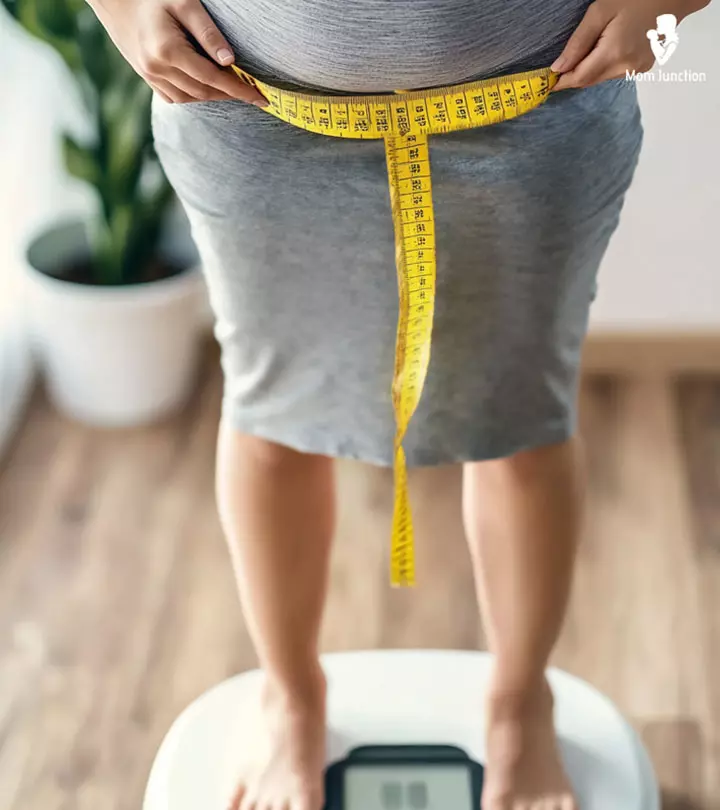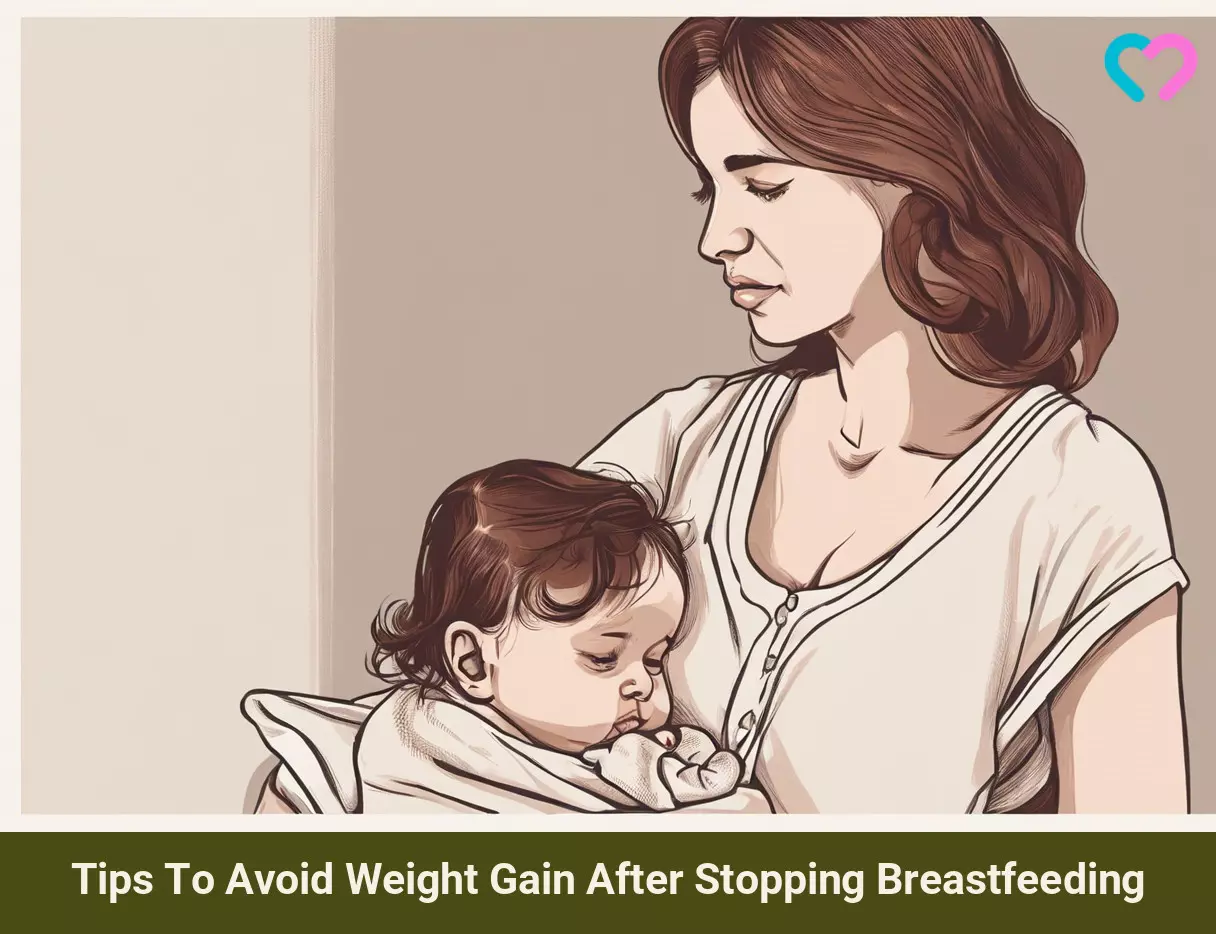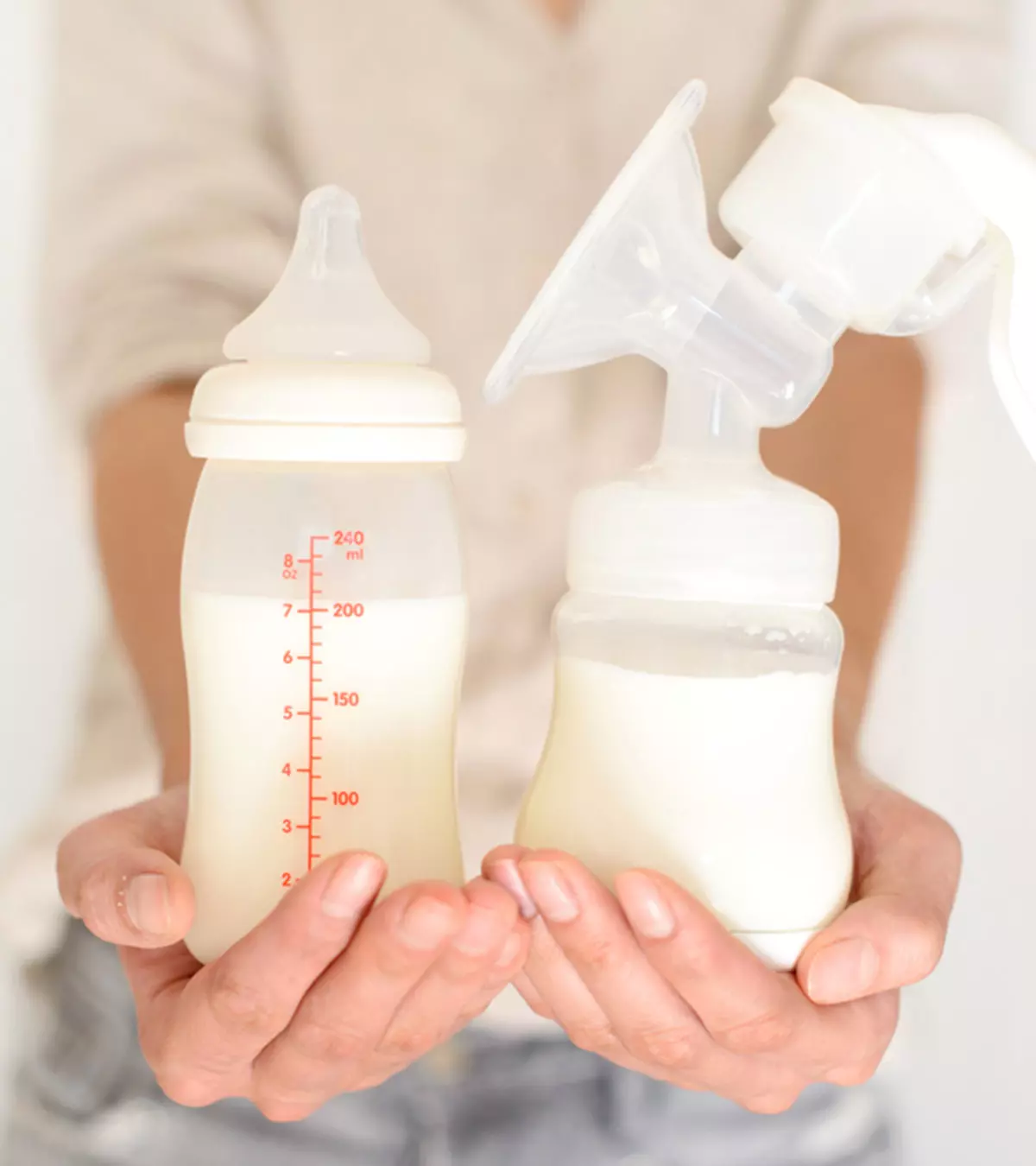
Image: Midjourney/ MomJunction Design Team
Many lactating mothers worry about the increased possibility of gaining weight after weaning. This is because lactationiProcess of secretion and feeding of breastmilk after childbirth assists in postpartum weight loss. During exclusive nursing (the first six months), you may consume an excess of about 400-500 kilocalories per 24 hours for milk production (1). However, the process of breastfeeding affects the metabolism, due to which you may end up losing some weight.

In this post, we discuss the effects of lactation and its link with maternal weight gain. While on the topic, note that dieting as a prevention for weight gain after breastfeeding is not recommended during lactation as it may comprise the nutritional needs of the mother and the baby.
Key Pointers
- There is no substantial scientific evidence of weight gain after cessation of breastfeeding.
- Hormonal changes, caloric surplus, and changes in eating habits and lifestyle can be reasons for weight gain after breastfeeding.
- Eating healthy, indulging in physical activities, and limiting excess calories or empty calories can help prevent weight gain after breastfeeding.
Will You Gain Weight Once You Stop Nursing?
Consultant obstetrician and gynecologist Dr. Shashwat Jani says, “Many women experience weight gain after stopping breastfeeding due to hormonal changes, increased appetite, and reduced metabolism.”
California-based childbirth and breastfeeding educator Mindy Cockeram says, “Women can experience weight gain after breastfeeding cessation because they do not adjust their caloric intake. If their caloric needs decrease but they continue eating the same amount, the body stores the extra as fat.”
There is no substantial research-based evidence that links weaningiProcess of transitioning a baby’s diet from breastmilk or formula to solids and other liquids and weight gain. It is true that breastfeeding burns more calories and also makes metabolism more efficient (2). However, the likelihood of weight gain after cessation of breastfeeding could vary from one woman to another. While some women gain weight after they wean their babies, it does not happen with all women.
What Causes Weight Gain After Weaning The Baby?
Some women may notice weight gain after they wean their baby.
Infographic: Body Changes After Weaning And Tips To Manage
Some thing wrong with infographic shortcode. please verify shortcode syntaxTrista Best, a registered dietitian from Dalton, Georgia, says, “When moms begin weaning their breastfed babies, the extra calorie need decreases. However, sometimes, moms will experience weight gain after weaning their baby and no longer making breast milk. This can have two causes: hormones and overeating on calories. A breastfeeding and weaning mom’s hormones are changing daily, which can cause the body to hold on to more weight. The weaning mother may also continue to eat the same calories that she ate while breastfeeding out of habit. This can cause weight gain.”
The weight gain after breastfeeding may occur due to the following causes.
1. Caloric surplus

According to the US Centers for Disease Control and Prevention (CDC), breastfeeding mothers need more calories to meet their requirements for nutrition and breast milk production (3). Thus, your appetite may increase during breastfeeding, and it may stay that way for a while even after you wean your baby. The excess calories may eventually lead to weight gain. Certified pregnancy and parenting consultant Sonali Shivlani notes, “To support the breastfeeding journey, a mother needs about 500 extra calories. When she stops breastfeeding, she must readjust her calorie intake to her pre-pregnancy levels. However, many women eat the same amount of food, particularly high-calorie foods”. The effects of caloric surplus could be compounded by a lack of physical activity and a sedentary lifestyle.
Caela Cook, a new mom, shares how her weight changed after she stopped breastfeeding her baby, “As soon as I stopped breastfeeding, I noticed my clothes were getting tighter. I wasn’t seeing my abs as much. I was literally eating the exact same foods, exercising just as much if not more, and I was just feeling so fat. I’ve never gained weight like this in my life. So, I hopped on the scale, and I was shocked. I had gone from 138 to 146, which is a pretty substantial weight gain for me in such a short period of time (i).”
2. Hormonal changes
Prolactin and oxytociniA hormone that stimulates let down of the accumulated milk while nursing are hormones that play a significant role in breastmilk production.
According to La Leche League GB, once you stop breastfeeding, postpartum hormones begin to decrease. Both oxytocin and prolactin play an essential role in your emotional wellness. Some women may experience depression or feel low, causing them to binge eat, which could cause weight gain (4).
Dr. Po-Chang Hsu, MD, from the Boston Metropolitan Area, says, “Beyond biological factors, emotional and lifestyle changes also affect weight. The transition from breastfeeding can be emotional, sometimes leading to stress or comfort eating. The structured routine of breastfeeding, which may have kept snacking in check, is gone, making mindless eating more likely. Also, the physical activity involved in caring for a nursing infant—such as frequent carrying—may decrease after breastfeeding ends, reducing overall daily movement.”
Elliot Reimers, a NASM-certified nutrition coach, explains, “Mothers experience hormonal changes after weaning, which can make them feel down. Weaning also makes them feel that they have lost connection with their child now that the child is growing up and ‘no longer needs her.’ When they feel negative emotions, some mothers turn to stress eating, leading to weight gain.”
 Quick fact
Quick factTips To Avoid Weight Gain After Weaning
Dr. Brittany Robles, a New York-basedOB/Gyn and NASM-certified professional trainer, says, “Once you stop breastfeeding, it is important to decrease your food intake a bit to compensate for the drop in your body’s energy requirement. It doesn’t have to be all at once. You can do this by gradually decreasing your serving sizes. Don’t eliminate foods, just eat a slightly smaller portion. Over time, your hunger and appetite will adjust to the change in caloric intake.”
Obstetrician and gynecologist Dr. Veena Madhankumar advises, “Be patient as your body adjusts, and consult a healthcare provider if needed for hormonal balance. Thirst could be mistaken for hunger, leading to overeating, so staying hydrated can help regulate appetite. Poor sleep and stress can increase cravings and slow metabolism, making rest and relaxation essential. Avoid emotional or mindless snacking by eating mindfully and stopping when full.”
The following tips could help you manage your food intake to shed the extra weight you gained after weaning your baby.

- Keep an eye on what you eat. Try to work on reducing the food intake gradually.
- Avoid rapid weight loss diets since they may make you cave into your cravings eventually, adversely affecting your maternal health.
- Listen to your body and eat only when you are hungry. Practice mindful eating by focusing on your meal without distractions, preventing overeating, and promoting a healthier relationship with food.
- Eat healthy snacks, such as fruits and nuts, to provide yourself with the necessary nutrients and calories.
- Practice mindful techniques such as meditation and light exercise to avoid stress after weaning.
 Quick tip
Quick tipYou may also make the following changes to your lifestyle.
- Engaging in moderate exercise is beneficial for weight management. If you do not have more free time on hand, you may spread out your workouts into various parts across the day.
- You may exercise 15-20 times multiple times a day.

- Stay active whenever possible. For instance, if you can walk to a place, then avoid using the car or bus.
- Start regular exercises, including cardio, yoga, and core strengthening, to ensure fitness and weight loss.
- If you have not exercised before, consult a trainer for tips on proper exercises and techniques.
- Set realistic goals. Losing excess weight could take weeks or even months. Respect your body’s limits, and do not push it to the point that you risk injury.
- You may try some fun workout ideas that can be done along with the baby here.
When To See A Doctor?
Even with regular exercise and a proper diet, it may take several weeks to months to lose weight. Your genes also play a significant role in deciding your weight. If you are unable to lose weight even after several months or are experiencing other hardships, such as blurred vision or body pain, you should see a doctor. You may also consult your doctor, a trainer, and a nutritionist before starting your new diet and exercise regimen.
Frequently Asked Questions
1. How do I lose my belly after breastfeeding?
You may reduce the extra calories you consume and work out regularly to reduce the postpartum belly fat once your baby is weaned. If you do not get the desired results, speak to a dietician for a suitable diet plan.
2. Can I still produce milk years after stopping breastfeeding?
Some women may experience milk discharge for up to two to three years after weaning the baby off breast milk. The milky discharge typically involves both the breasts. However, not all women may experience this (5).
3. Does the frequency of breastfeeding before stopping affect the likelihood of weight gain?
Increased breastfeeding may impact postpartum weight retention. According to a study, mothers who fully breastfeed their babies for a prolonged period (at least three months) had reduced pregnancy weight retention (8).
4. What role does emotional health play in weight gain after breastfeeding?
High levels of emotional stress and postpartum depression may cause a woman to resort to comfort eating, leading to unhealthy food choices and excess food consumption. These choices eventually lead to excess weight gain.
Some women associate breastfeeding with weight gain, but no studies have proven the same. However, gaining weight after weaning due to surplus calories or hormonal changes is commonly noticed. Moderate exercise, eating a healthy diet, and staying active as much as possible are a few tips that can help manage weight gain after breastfeeding the baby. However, note that losing the extra baby weight will take time, so do not rush to lose weight faster.
Illustration: Tips To Avoid Weight Gain After Stopping Breastfeeding

Image: Stable Diffusion/MomJunction Design Team
Personal Experience: Source
MomJunction articles include first-hand experiences to provide you with better insights through real-life narratives. Here are the sources of personal accounts referenced in this article.
i. What Happened When I Stopped Breast Feeding;https://www.youtube.com/watch?v=MTZM30PrXQA&feature=youtu.be
References
1. Erica P. Gunderson, Impact of Breastfeeding on Maternal Metabolism: Implications for Women with Gestational Diabetes; US National Library of Medicine
2. Hayden W. Hyatt et al., Lactation has persistent effects on a mother’s metabolism and mitochondrial function; Scientific Reports volume 7
3. Maternal Diet and Breastfeeding; Centers for Disease Control and Prevention
4. After weaning – what next?; La Leche league
5. Lactating but not nursing; Go Ask Alice
6. Changes That Come with Weaning; Texas Health
7. Losing weight after pregnancy; MedlinePlus
8. Muna J.Tahir et al.; Association of Full Breastfeeding Duration with Postpartum Weight Retention in a Cohort of Predominantly Breastfeeding Women; US National Library of Medicine
Community Experiences
Join the conversation and become a part of our nurturing community! Share your stories, experiences, and insights to connect with fellow parents.
Read full bio of Regina Kincaid

Sonali Shivlani is a certified pregnancy and parenting consultant with over 20 years of experience. She is attached to PD Hinduja Hospital and Women's Hospital in Mumbai, India as a visiting lactation counselor for in-patient mothers. She is certified by the Child Birth and PostPartum Professionals Association, USA.
Sonali Shivlani is a certified pregnancy and parenting consultant with over 20 years of experience. She is attached to PD Hinduja Hospital and Women's Hospital in Mumbai, India as a visiting lactation counselor for in-patient mothers. She is certified by the Child Birth and PostPartum Professionals Association, USA.
- Dr. Shashwat Jani is a consultant obstetrician & gynecologist in Smt. N.H.L. Municipal Medical College, Ahmedabad. He has 14 years of experience with a special interest in high-risk pregnancy, infertility, and endoscopy.
 Dr. Shashwat Jani is a consultant obstetrician & gynecologist in Smt. N.H.L. Municipal Medical College, Ahmedabad. He has 14 years of experience with a special interest in high-risk pregnancy, infertility, and endoscopy.
Dr. Shashwat Jani is a consultant obstetrician & gynecologist in Smt. N.H.L. Municipal Medical College, Ahmedabad. He has 14 years of experience with a special interest in high-risk pregnancy, infertility, and endoscopy. - Mindy Cockeram is a board-certified lactation consultant and runs her private practice in South Carolina. She trained as an antenatal teacher with the National Childbirth Trust (NCT) in London, England and taught childbirth classes for the NCT and St Georges Hospital Trust. Later, she relocated to the US.
 Mindy Cockeram is a board-certified lactation consultant and runs her private practice in South Carolina. She trained as an antenatal teacher with the National Childbirth Trust (NCT) in London, England and taught childbirth classes for the NCT and St Georges Hospital Trust. Later, she relocated to the US.
Mindy Cockeram is a board-certified lactation consultant and runs her private practice in South Carolina. She trained as an antenatal teacher with the National Childbirth Trust (NCT) in London, England and taught childbirth classes for the NCT and St Georges Hospital Trust. Later, she relocated to the US. 
Dr. Veena Madhankumar is an experienced obstetrician and gynecologist with 25 years of clinical expertise. She completed her MBBS from Coimbatore Medical College, India, in 1999 and pursued her MD in Obstetrics and Gynecology from Sri Ramachandra Medical College, Chennai, India. Dr. Madhankumar has been associated with iCliniq for over a decade, providing expert medical consultations and guidance. She has also established a practical laparoscopy training course.
Dr. Veena Madhankumar is an experienced obstetrician and gynecologist with 25 years of clinical expertise. She completed her MBBS from Coimbatore Medical College, India, in 1999 and pursued her MD in Obstetrics and Gynecology from Sri Ramachandra Medical College, Chennai, India. Dr. Madhankumar has been associated with iCliniq for over a decade, providing expert medical consultations and guidance. She has also established a practical laparoscopy training course.

Dr. Po-Chang Hsu is a medical doctor and medical content expert. He received his medical degree from Tufts University School of Medicine in Boston in 2016. Previously, he did a master’s degree at Harvard University and wrote a thesis on neuroimaging in schizophrenia patients at Brigham and Women’s Hospital. He currently works at Alpas Wellness.
Dr. Po-Chang Hsu is a medical doctor and medical content expert. He received his medical degree from Tufts University School of Medicine in Boston in 2016. Previously, he did a master’s degree at Harvard University and wrote a thesis on neuroimaging in schizophrenia patients at Brigham and Women’s Hospital. He currently works at Alpas Wellness.
Read full bio of Dr. Ritika Shah
Read full bio of Swati Patwal
Read full bio of Ghazia Shah


















